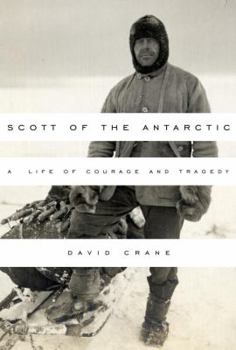Scott of the Antarctic: A Life of Courage and Tragedy
Select Format
Select Condition 
Book Overview
A richly illuminating biography of Robert Falcon Scott, and the first to transcend the myths that have taken root in the story of his life. Since Scott's death in 1912, he has been the subject of... This description may be from another edition of this product.
Format:Hardcover
Language:English
ISBN:0375415270
ISBN13:9780375415272
Release Date:November 2006
Publisher:Alfred A. Knopf
Length:572 Pages
Weight:2.25 lbs.
Dimensions:1.6" x 6.6" x 9.3"
Customer Reviews
3 ratings
Captains Courageous
Published by Thriftbooks.com User , 17 years ago
David Crane shows how the death of the explorer Captain Scott galvanized the UK on the edge of World War I, but he qualifies British response to the tragedy by pointing up that, despite the weight of popular opinion, the pre-war Edwardian years were not exactly the Golden Age of empire the way they are nowadays painted. Crane's life of Scott is in every way a re-revisionist biography, kicking against what he feels has been the unfair denigration of Scott's life and deeds over the past thirty years. Sometimes this approach works, sometimes it doesn't. Through meticulous handling of evidence, he tells the story without a hint of strain, and yet sometimes whole paragraphs stop the action to argue that history has shafted Scott once again. A prototypical Englishman in the days when "God was an Englishman," Scott has suffered from unthinking backlhas, or so says Crane, and indeed he says it about four hundred times so that, frankly, I began to sympathize with Scott's attackers a bit, for no one's that perfect. Indeed Crane admits as much, citing his rivalry with Shackleton and then finally with Amundsen as proof, but in each case, the other man is deeply at fault and Scott was just trying to muddle through on Naval smarts and years of experience leading men. It was a time for heroics, and something in the air (together with a thriving media culture) made heroes out of the most unlikely souls. England expected every man to do his duty, and alas so did Norway and Amundsen came home with the gold, so to speak, whereas the Englishmen after the same glittering prize were all dead by the time Amundsen returned home. "The Englishmen, the goal accompished," bleated the press, "lay quiet in the snows. Through the months since . . . while wives and friends set forth for meetings and counted time, they lay oblivious. All was over for them long ago." Beyond the heroics of the era, Crane attributes the legend of Captain Scott to his indispitable skill as a prose writer. There is something macabre about the veneration given to his last journal, found by the relief party, but it's a bizarre twist totally understandable in the context, the words that live on after the hand that wrote them has grown cold and still. Without that last journal, its reinscription of subaltern heroics, its narrative of deprivation and memory and love, how else would Scott be remembered? In this regard Crane has an interesting passage about the way in which Westminster Abbey had its own little competition going on with St. Paul's Cathedral about which site had the most pomp and had the most heroes of empire commemmorated there.
An Admiring View of a Complex Man
Published by Thriftbooks.com User , 17 years ago
I particularily like the subtitle to this book, 'a life of courage and tragedy.' Scott was undoubtedly courageous. He could not have been otherwise. On the other hand, his courage and drive to get to the South Pole was not exactly balanced by experience or perhaps by common sense. There's an old saying that if you wanted to get somewhere like the South Pole, Scott would have been a good leader to follow, but if you wanted to get back, then other expedition leaders like Shackleton would be your first choice. Shackleton's quotation: 'Better a live donkey than a dead lion.' Consistent with this, Scott got to the South Pole, Shackleton didn't. Scott didn't get back. In this book, the author is clearly a deep admirer of Scott. And indeed he did great things. Coming from a humble beginning he appeared driven to accomplish things, and he did. He was a complicated man, and Mr. Crane's access to the family papers and Scott's letters give a view that is perhaps more balanced than what we have seen before. If nothing else, Mr. Crane is an excellent writer and the story becomes one of those can't put down books.
A brilliant book
Published by Thriftbooks.com User , 17 years ago
The history of Arctic exploration is not a subject I've ever had a particular interest in. I picked this book up more or less by chance, was intrigued enough to buy it ... and haven't been able to put it down. The story itself is absolutely gripping from beginning to end, but it's the intelligence and skill of the writing that makes this such a memorable and remarkable book. Wonderful. Six stars.





